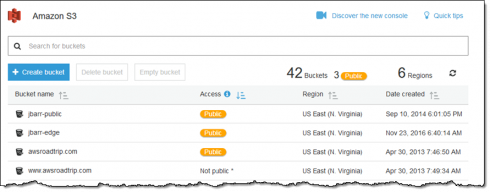
AWS has added four new controls to S3 to help prevent leaks. Amazon S3 buckets and objects are private by default, but settings can be changed that make them public.
“We want to make sure that you use public buckets and objects as needed, while giving you tools to make sure that you don’t make them publicly accessible due to a simple mistake or misunderstanding,” Jeff Barr, chief evangelist for AWS, wrote in a post.
For those managing public access control lists (ACL), Amazon has added an option that blocks the use of new public buckets or object ACLs, and an option that removes public access granted through ACL. For those managing public bucket policies, it added an option that blocks new public bucket policies and one that blocks public and cross-account access to buckets with public policies.
Flexera releases AdminStudio 2018 R3
Flexera has announced the release of AdminStudio 2018 R3, which is an application readiness solution for packaging and managing applications.
It adds integration with VMware Workspace ONE, proactive assessment of current applications, vendor command line support, and EXE wrapping.
Databricks adds support for Apache Spark 2.4.0
Databricks has announced support for Apache Spark 2.4.0 in Databricks Runtime 5.0. Released earlier this month, Apache Spark 2.4.0 introduces Project Hydrogen, which improves the performance of distributed deep learning frameworks on Apache Spark.
“Innovation continues to thrive within the Apache Spark community. Project Hydrogen is the most recent major initiative with an aim to provide first-class support for popular distributed machine learning frameworks on Apache Spark,” said Reynold Xin, co-founder of Databricks.
Databricks Runtime 5.0 also adds a new feature called HorovodRunner, providing a simple way of scaling up deep learning training workloads.
Mimecast for IBM QRadar released
Mimecast has announced a new integration with IBM QRadar. Mimecast for IBM QRadar, which is IBM’s security information and event management software, will provide customers with better visibility into vulnerabilities and ongoing attacks. Customers will be able to address incidents through a single console.
“Attack methods are quickly evolving and growing more advanced, targeted and dangerous. Organizations are seeking out solutions to augment a defense strategy, but at the same time are challenged with siloed security products which offer little-to-no visibility, which makes it increasingly difficult to ensure they are identifying incoming threats and prioritizing investigations,” said Christina Van Houten, chief strategy officer of Mimecast.






